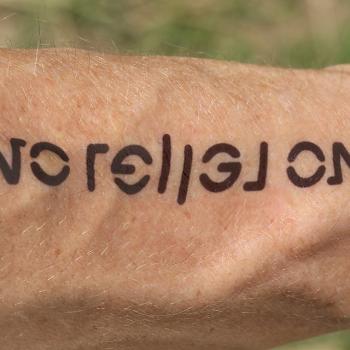It was not coincidental that God the Son became incarnate at a moment in history when He would be put to death, as though Jesus simply happened to live in a particular time and place that was especially averse to what he taught. No, the world of the flesh will always despise Christ, for Christ reveals the truth that we are dead in sin and will only find true life when we trust in God's grace and die to ourselves.
Since the Church can never so radically transform the culture of the world that the world of the flesh (which will remain until the consummation) will cease to hate the truth that Christ makes visible before it, Christ will be persecuted wherever and whenever he lives, whether that is in 1st-century Palestine or in the lives and communities of those who imitate him today. Christ calls us to "remain in me," but Christ is not a static object. It is only in imitation that we remain in Christ: in expounding the scriptures in the synagogues and cleansing the temples of our society, in meeting seekers at the wells and pools and porticos, in preaching the truth when the crowds are deserting us, in reaching out to those whose faith is faltering and whose feet are sinking beneath the sea, in bearing the love of God into the slums of the needy and the corners of the outcast, and in walking the long and blistering path to the cross where we sacrifice ourselves for others.
Since we have failed as individuals to follow Christ and be shaped into his image, the Church has failed to be the Church: the Militant Church in the classical sense, the Suffering Church, the Church that stands always for the grace and truth of Christ, the Church that images Christ in teaching the things Christ taught and walking the way Christ walked. It is not the fault of "the Church," as though the Church were set apart from us. It is our fault; we who follow Christ are the Church whether we like it or not.
I love the Church, and many excellent churches do valuable work. Yet the intuition felt broadly across American Christendom is not wrong. The American Church is failing to be the Church -- it is only when people speak this message with scorn or with transparent political motivations (as though the adoption of a new political platform is the solution to our problems) that they discredit the message. Failing to serve the poor (though we do not all agree on the policies that best serve them) is a symptom of what ails us. Those who are calling for reform in our doctrine and those who are calling for reform in our practices are both right -- but the fundamental problem, the reason we have failed to bear the fruit that nurtures the culture around us, is that we have failed as individuals and communities to remain in Christ through imitation.
This is not cause for despair, because it illuminates the task set before us. Only those can fail to have hope for the world who fail to have hope in the Church. And only those can fail to have hope in the Church who fail to have hope in Christ. Yet our Lord is an undying Lord, a Lord whose power even death could not contain. I believe God's call to American believers right now is to recommit ourselves to the imitation of Christ as individuals and communities. When we are following Christ and remaining in him, then our churches will have their proper effect on culture, making the truth and love of God known to the world.
Those who do this will do so because they love Christ more than all things -- but when we do this, then the transformative effect upon the world around us will be profound. Then, although we will always face scorn from some and persecution from others, and although the world of the flesh will always be at war with Christ, we will more deeply and powerfully shape the communities and structures and institutions around us. Then we will be the salt that preserves what is good within our culture, and the light that shows the way forward. Then through our words and deeds we will make plain what is truly True and truly Good and truly Beautiful. Then we will shed the grace of God throughout the marketplace and government.
Let me confess that I do not, of course, know the future. I do not know whether or how this will happen. We have no assurance that the Church will remain strong until the end of days. But we do know that the Church is the Bride of Christ, and he will never cease to woo her. Let me confess too that the call to imitation must be fleshed out in the context of our present lives-where we have financial obligations and demands upon our time, and everyday faithfulness takes extraordinary wisdom and discernment. This is more like a call to arms than a battle plan-and I will explore what imitation means in the later parts in this series. And finally let me confess that I myself am extremely far from fulfilling this call to imitation. But I believe it is Christ's call upon my life, and I am convicted of my failure.





